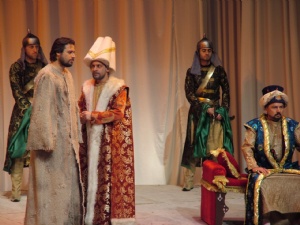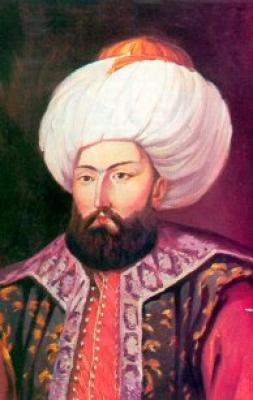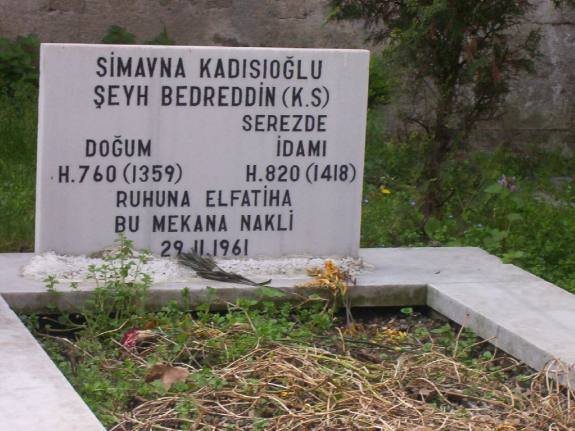(1).jpg)
SHEIKH BEDREDDIN, SON OF THE QADI OF SIMAVNA
Sheikh Bedreddin is one of the most debated figures in Ottoman history. Besides being a great scholar of Islamic jurisprudence (fiqh), he is known for his words that pushed the boundaries of belief. To some, he is a socialist revolutionary.

The Sheikh Rises Up..
It is said that his father was the qadi (judge) of Simavna (Kyprinos in Greece now). For this reason, he is known as the Son of the Qadi of Simavna. This was one of the towns of Rumelia, between Karaağaç (now in Turkey) and Didymoteicho (now in Greece). Some call him “Simavi,” but this is wrong. In Edirne, Konya, and Egypt he studied religious and scientific subjects from the prominent scholars of the time. Scholars used to present him as an example to everyone. In Egypt he drew the attention of Sultan Barquq. The sultan appointed him as tutor to his son. He married him to his concubine. There, he affiliated himself with Sheikh Ahlati. Later he went to Tabriz and met Emir Timur (Tamerlane). Timur wanted to marry him to his daughter and appoint him as sheikh al-Islam, but Bedreddin, due to his longing to return to his teacher, did not accept.
When his sheikh passed away, he took his place. However, he could not get along with the scholars in Cairo. He returned to Edirne. On the way he gained many disciples. Even Karaman Bey and Aydınoğlu Cüneyd Bey became his disciples. He met Somuncu Baba. During this time, he became acquainted with Börklüce Mustafa and Torlak Kemal, who would play an important role later in his life. The Greek administrators of the island of Chios invited him to the island. There he caused many people to convert to Islam.
At that time, Sultan Bayezid I had died; a struggle for the throne had begun among his sons. Prince Musa Çelebi defeated his brother Süleyman Çelebi and captured Edirne. He appointed Sheikh Bedreddin as kazasker (the chief of judges). Later, when Musa Çelebi was defeated by his brother Mehmed Çelebi, Bedreddin was subjected to residence in İznik with a salary of 1,000 akçe. The Sheikh, who had a proud and ambitious character, could not tolerate this exile. He began political propaganda against the sultan. He gathered many men around him. While he was in İznik, his steward Börklüce Mustafa revolted in Izmir with 5,000 men. In Manisa, Torlak Kemal joined him with 3,000 men. Both rebellions were suppressed with difficulty.

More Important than Thessaloniki
Bedreddin wanted to go to Cairo. But the sultan did not allow it. Fearing he would be held responsible for Börklüce’s revolt, he fled to Kastamonu and took refuge with İsfendiyar Bey. Thus, he fell into the position of being guilty by breaking the compulsory residence order given by the sultan himself. Moreover, his identity as “a man of Musa Çelebi” increased the severity of his crime. But İsfendiyar Bey, not wanting to oppose the sultan, paid no heed to the Sheikh.
When he could not find the support he hoped for, he left Sinop by ship to go to Crimea. When Genoese ships blocked his way, he landed in Rumelia and sought refuge with the Prince of Wallachia, who had once been Musa Çelebi’s ally. Former timar (fief) lords and a discontented mass joined him. His supporters gradually increased. By the time he arrived in Silistra (now in Bulgaria), he was already in open revolt.
At this time, the sultan had set out to conquer Thessaloniki. Saying, “Eliminating sedition is more important than the conquest of Thessaloniki,” he came to Serres. The 200 men sent against him dispersed the Sheikh’s forces. The Sheikh hid in a forest in Zagora (now in Bulgaria). When the news of Börklüce’s death arrived, Bayezid Pasha sent men to him pretending to want to become his disciples. Falling into the trap, the Sheikh was handed over by his own men. He was brought before Sultan Mehmed Çelebi in Serres (now in Greece). Since he was not a simple rebel but also a scholar, his trial was ordered to be conducted in the presence of scholars. During the very fair trial, he debated comfortably with the scholars in the committee, and even with the sultan. In the end, it was decided that he was a rebel.
The sultan asked the Sheikh himself to give the verdict. The Sheikh said that the punishment for this crime was execution. He did not fail to add that Börklüce had acted in haste. In 1420, he was hanged in Serres, which is within the borders of present-day Greece. His family and possessions were not touched. From this, it is possible to understand that he was considered a bagi (rebel) and not a murtad (apostate). For the property of an apostate is confiscated, but that of a rebel is given to his family. After the 1924 population exchange, the immigrants who came to Istanbul also carried his remains and kept them for years in a zinc coffin. By the order of the 1960 coup plotters, he was buried in the tomb of Sultan Mahmud II. That the bones of one punished as a rebel were buried in a sultan’s tomb is a strange irony of fate.

The Sheikh Who Trusted His Spiritual States
Some Ottoman historians say that Bedreddin did not rebel, that he was completely innocent, and fell victim to the slanders of the envious. Most historians, however, write that he was pursuing a claim to the throne. Sheikh Bedreddin was a rebel who was used by extremist opponents of the new sultan and was defeated by his pride. Idris Bitlisi says that the Sheikh gave much importance to asceticism (riyadah) and spiritual struggle (mujahadah), then fell into arrogance by trusting the states he attained through these, and because he could not receive spiritual illumination from a perfect guide (murshid al-Kamil), he was dragged into this condition, and that those who gathered around such a person slipped into permissiveness (ibaha, the belief that everything is permissible). After his death, a group emerged claiming to follow his path, and later they followed Sheikh Junayd, the grandfather of Shah Ismail.
The books written by the Sheikh are among the most valuable works of Hanafi jurisprudence. However, in the work attributed to him called Waridat, he is said to have put forward some extreme ideas based on wahdat al-wujud (unity of being); he was accused of denying that the universe was created and of denying bodily resurrection, and of attributing symbolic meanings to concepts such as paradise, hell, angels, and Satan. But even if these words are certainly his, they have been suitably interpreted. Most of the later Ottoman scholars praised him for his scholarly aspect and considered what he did an unfortunate event. Thus, it is not a trivial matter, and the accusations of heresy (ilhad) against him are true. Cevdet Pasha tells that there was no copy of Waridat in Istanbul because Sheikh al-Islam Arif Hikmet Bey would buy up this book wherever he found it, cheap or expensive, and destroy it.
Once a very great scholar, standing out with his intelligence and quick-wittedness, Sheikh Bedreddin, who is said to have put forward the first principles of communism, is among the most debated figures. Nazım Hikmet, socialist poet, turned his life into poetry under the name The Epic of Sheikh Bedreddin. However, it has been understood that the socialist views rejecting private property did not belong to him but to his disciple Börklüce; that is, at least in this respect, the Sheikh is innocent.
Önceki Yazılar
-
THE WATER OF IMMORTALITY IN THE “LAND OF DARKNESS”28.01.2026
-
THE WORLD LEARNED WHAT FORBEARANCE IS FROM SULTAN MEHMED II21.01.2026
-
THE RUSH FOR GOLD14.01.2026
-
TRACES OF ISLAM IN CONSTANTINOPOLIS7.01.2026
-
WHO CAN FORGIVE THE KILLER?31.12.2025
-
WHEN WAS PROPHET ISA (JESUS) BORN?24.12.2025
-
IF SULTAN MEHMED II HE HAD CONQUERED ROME…17.12.2025
-
VIENNA NEVER FORGOT THE TURKS10.12.2025
-
THE FIRST UNIVERSITY IN THE WORLD WAS FOUNDED BY MUSLIMS3.12.2025
-
WHO BETRAYED PROPHET ISA (JESUS)?26.11.2025